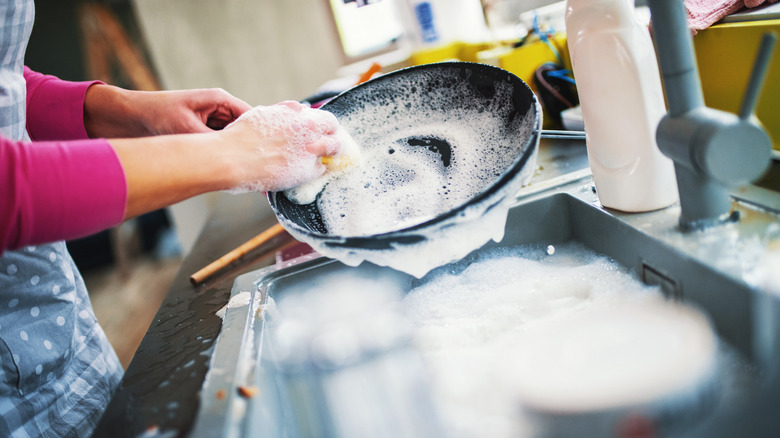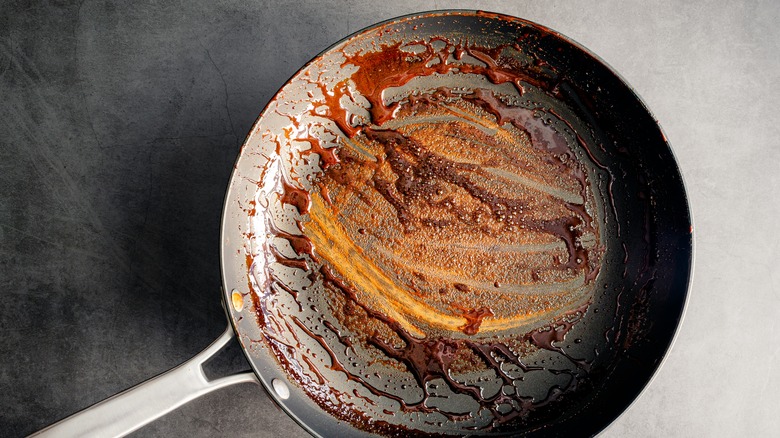Here's The Easiest Way To Clean Those Dirty Aluminum Pans
The fun part of cooking happens at the beginning. You plan out each meal, trying old favorites or testing new recipes. You gather ingredients, chopping and slicing and dicing. You saute, roast, and simmer, tasting as you go until everything is brimming with flavor. But once the best part (eating, of course) is over, you're left with the mess. It's the dreaded part of the cooking process — when you walk back to see kitchen utensils, and pots and pans spread around, waiting to be addressed. And even though some tools are easy to toss into a dishwasher or a soapy sink, others are a struggle to clean.
One of those particularly finicky kitchen tools is aluminum. If you spend a lot of time in the kitchen, those aluminum pots, pans, and baking sheets are ones that you use nearly every day, but if you find yours discolored or with lots of food buildup, it can feel beyond repair. Sponges and soap don't seem to make a dent. Luckily, two other common kitchen ingredients will come to your rescue to bring out aluminum's original shine: salt and baking soda. Salt can help with caked-on food, and baking soda can get the pan looking good as new.
Deep clean to get them sparkling
Caked-on food can be frustrating, but just a few tablespoons of salt might do the trick. Start by filling the pot or pan with water and some table salt, then bring the water to a boil. The crucial next step is to take the pan off the heat and ensure that your cookware is entirely cold before you do anything else — besides being dangerous to handle hot pots and pans, the heat can also make the cleaning less effective. After it's cool, wipe the aluminum with a gentle sponge and rinse it with water before drying.
If the stains are particularly stubborn, this will be one of your many baking soda cooking hacks. You can use a baking soda and water mixture alone for this method, but if your stains need a firmer hand, the baking soda can also be combined with white vinegar, lemon juice, or even hydrogen peroxide. Start with a simple soak in warm, soapy water, and while the aluminum soaks, make a paste from the baking soda and liquid. Apply the paste to your pan, then scrub it with a soft brush. If this doesn't do the trick, let the paste sit for a few hours or overnight to do its work before scrubbing. Make sure that no matter your method, you use a nonabrasive brush or sponge so you don't scratch the aluminum — and don't forget to dry before putting the cookware away.
Regular maintenance keeps them tidy
If you take good care of your aluminum cookware, the hard stains and built-up bits should be pretty infrequent — deep cleans like these shouldn't be a common occurrence, and the everyday maintenance is quite simple. After every use, start by rinsing any food from the pan with warm water. Then, let it soak briefly in a mixture of warm water and a mild detergent before scrubbing it gently with a sponge (nonabrasive, as always). Rinse it off and let it dry completely. If the pots and pans don't dry completely before you put them away, it can cause a buildup to form on them.
While it is more work, your aluminum pots and pans should never be put in the dishwasher. Typical dishwashing detergents are too harsh for aluminum, and the high heat in a dishwasher can cause damage. Depending on your dishwasher, they can also be too rough and scratch the cookware's surface. This regular maintenance cleaning for pots and pans isn't complicated, but it will save you from having to rescue the aluminum cookware from irregular wear and tear.


